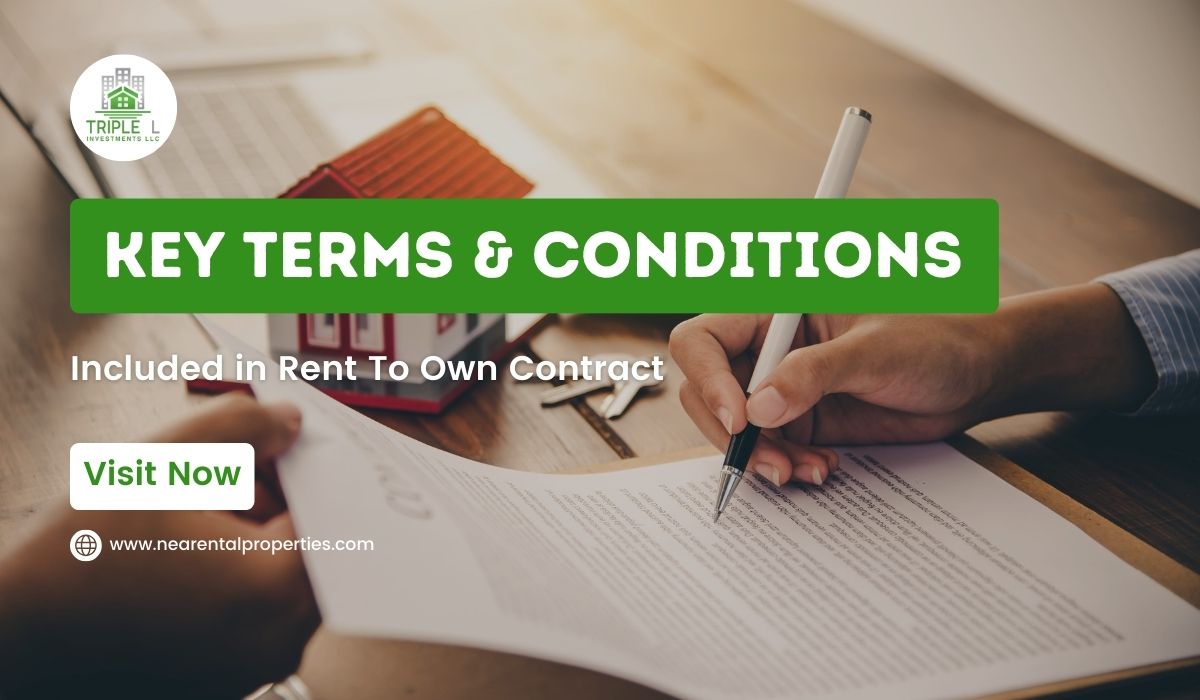Budgeting for a rent to own arrangement is essential to homeownership. Rent-to-own agreements demand careful financial preparation. Budgeting is essential for a successful rent-to-own experience, from understanding your financial responsibilities to planning for future expenses.
Maintaining a realistic budget and diligent financial management helps enhance the benefits of rent-to-own while reducing financial risks. Mastering budgeting is crucial to attaining your homeownership goals with confidence and financial stability.
Whether you’re considering or already in a rent-to-own agreement, this guide covers the basics of rent-to-own budgeting, giving you the knowledge and tools to make smart financial decisions.
Budgeting Tips for Rent To Own Home
Commitments to the Financial Plan:
Potential rent-to-own tenants must understand their financial obligations. This step involves understanding the financial requirements and responsibilities of such an arrangement.
Tenants must understand their financial obligations throughout the lease, from initial costs to monthly rent payments and future purchasing considerations. By understanding these financial components, tenants can assess their ability to pay the rent-to-own home and budget for its expenses.
Understanding financial commitments promotes transparency and consistency between tenants and landlords, making rent-to-own mutually profitable and sustainable. Thus, tenants must understand the financial ramifications of a rent-to-own agreement before signing, assuring financial stability throughout the lease.
Making a Financial Assessment:
Assessing your finances is essential to starting a rent-to-own deal. Actively assessing your finances helps you determine if rent-to-own properties are affordable. To assess your financial health, examine your income, expenses, debts, and savings.
Consider your credit score, work position, and debts when applying for a rent-to-own arrangement and landlord terms. Check your long-term financial goals and priorities to see if rent-to-own fits.
Assessing your financial status allows you to make informed decisions and create a realistic budget that meets your needs and sets you on the path to successful homeownership through a rent-to-own agreement.

Budgeting and Affordability:
Understanding your budget and affordability is essential to the rent-to-own process. This involves examining your income, expenses, debts, and savings to determine what you can afford. Subtract housing, utilities, transportation, and groceries from your monthly income.
Debts and financial responsibilities may affect your budget. To maintain financial stability, account for income variations and unforeseen expenses.
Knowing your financial situation lets you budget for rent-to-own payments, choice fees, and other homeownership charges. By evaluating your budget and affordability early, you can make informed decisions that correspond with your financial goals and reduce financial pressure throughout rent-to-own.
Preparing an Upfront Cost Budget:.
Rent-to-own preparation requires upfront expense budgeting. These initial costs include financial obligations tenants must understand before signing. Option fees guarantee the purchase of the property at a predetermined price, as well as security deposits.
If they buy the property, tenants may need to pay for home inspections, appraisals, and closing costs. By understanding and planning for these upfront expenditures, tenants can prepare financially for rent-to-own. In this way, tenants can manage their finances and confidently navigate the rent-to-own process.
Rent Payment Estimation:
Budgeting for a rent-to-own home requires estimating monthly rent payments, which affects your financial obligations.
Rent-to-own tenants pay monthly rent, which may include a rent credit toward the property purchase. The renter and landlord negotiate the rent based on the property’s market worth, location, size, and condition. The rent should also fit your budget and financial situation to ensure affordability during the renting duration.
By precisely forecasting monthly rent payments, tenants can develop a realistic budget to meet their financial obligations while striving toward homeownership.

Maintaining and Repairing Equipment:
Financial preparation for a rent-to-own agreement must include maintenance and repair charges. Like homeowners, tenants maintain properties in such agreements. This includes budgeting for gardening, cleaning, and small repairs to keep the property in good condition during rental.
Additionally, tenants should budget for unforeseen expenses like appliance or plumbing repairs. Tenants may manage their budgets, avoid unforeseen financial pressures, and maintain property value by preparing for maintenance and repair needs.
This proactive strategy creates a positive living environment and helps the rent-to-own agreement succeed, ensuring a smooth transition to homeownership.
Purchase Option Fee Savings:
Saving the purchase option fee is vital to acquiring a rent-to-own house and becoming a homeowner. The renter pays the purchase option fee at the start of the rent-to-own agreement to have the exclusive right to buy the property at a predetermined price at the end of the lease.
The tenant pays this non-refundable deposit to show the landlord that they are serious about buying the home. Saving for the buy option fee is a big investment and demands dedication.
Tenants must examine their finances, make realistic savings objectives, and create a savings plan to save enough money. Residents can succeed in rent-to-own by saving for the purchase option fee, building the groundwork for homeownership and financial stability.
Financial Stability in The Future:
A rent-to-own arrangement must consider future financial stability to achieve long-term success and reduce financial risks. This step entails assessing your long-term financial condition, including income, expenses, and unexpected events.
By assessing future financial stability, you can anticipate issues such as variations in income, unexpected expenses, and housing requirements. Rent-to-own agreements help you make informed decisions about your long-term financial goals. Professional financial counsel can also help you examine and improve your financial health, making homeownership easier.
Conclusion
In conclusion, financial planning and foresight are essential to building a realistic rent-to-own budget. A strong financial foundation is necessary for managing a rent-to-own agreement and becoming a homeowner.
You may develop a budget that meets your goals and skills by carefully reviewing your income status, budget, and affordability. You may also prepare for upfront charges, monthly rent payments, and future expenses.
Rent-to-own deals work if you factor in maintenance and repair costs, along with saving for the purchase option. Your rent-to-own journey will be more successful if you plan and manage your finances well.
Frequently Asked Questions
You should assess your current financial situation to determine your affordability.
You may have to pay an option fee, a security deposit, and maybe even closing costs upfront.
Tenants and landlords often negotiate rent-to-own agreements, which may include a portion allocated as a rent credit.
The tenant is usually responsible for maintenance and repair costs in a rent-to-own agreement, just like a homeowner.
Saving for the purchase option fee should be part of your budgeting plan since it is a non-refundable fee.
Your financial future, including income, expenses, and other obligations, must be considered.
According to the agreement, additional costs may include property taxes, homeowner’s insurance, and possible HOA fees.
Assess your income, expenses, and financial goals to plan a realistic and sustainable budget for the duration of your rent-to-own contract.
You can re-negotiate the terms of the lease agreement or seek financial assistance if you encounter financial difficulties.










